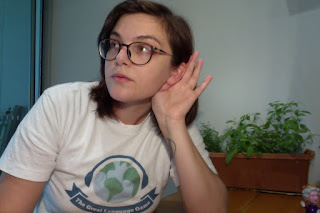Nasality in a world of orality
Nasal leakage: It's a real condition affecting field linguists around the world. Does the language you work on have nasal sounds? Rhetorical question! Of course, it does! Even if nasality is a non-contrastive feature of a language, air finds its way out through the schnoz one way or another during language production [ WALS; nasality ] . There's no stopping the all-knowing nose . While the burning question on everyone's mind is, if the magnificent bone structure of Worf's forehead is connected to his nasal cavity, what kind of resonance can we expect, there's a more pressing issue here (yes, really). A survey of 372[1] grammars listed on the Grammar Watch List of the Association of Linguistic Typology revealed that empirical bases for claims regarding nasality are virtually non-existent. In cases were nasality was described, they were solely based on impressionistic observations. The reasons for this in the past had often been just; equipment for ...


